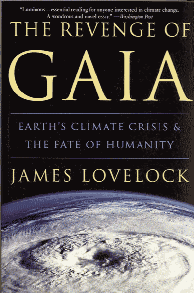 |
|||||||||||||||||||||||||||||||||||||||||
 |
|||||||||||||||||||||||||||||||||||||||||
This week we again feature items from the Gaiam “Harmony” catalog. That is spelled correctly, G-a-i-a-m. Gaia (as in “earth”) plus “Om,” maybe, as in, you know, "Ommmmm." Bliss, etc. Gaia. Please note in the book excerpt below James Lovelock's use of Gaia and how Gaiam Living uses Gaia. Upsetting, isn't it? Angry, angry, tiny mad things flood the blood. Time for some de-tox-i-fi-ca-tion. |
|||||||||||||||||||||||||||||||||||||||||
 |
|||||||||||||||||||||||||||||||||||||||||
 |
|||||||||||||||||||||||||||||||||||||||||
 |
|||||||||||||||||||||||||||||||||||||||||
from: The Revenge of Gaia: by James Lovelock Copyright ©2006 James Lovelock Basic Books
Chapter 8 A Personal View of Environmentalism
The concept of Gaia, a living planet, is for me the essential basis of a coherent and practical environmentalism; it counters the persistent belief that the Earth is a property, an estate, there to be exploited for the benefit of humankind. This false belief that we own the Earth, or are its stewards, allows us to pay lip service to environmental policies and programmes but to continue with business as usual. A glance at any financial newspaper confirms that our aim is still growth and development. We cheer at any new discovery of gas or oil deposits and regard the current rise in petroleum prices as a potential disaster, not a welcome curb on pollution. Few, even among climate scientists and ecologists, seem yet to realize fully the potential severity, or the imminence, of catastrophic global disaster; understanding is still in the conscious mind alone and not yet the visceral reaction of fear. We lack an intuitive sense, an instinct, that tells us when Gaia is in danger. So how do we acquire, or reacquire, an instinct that recognizes not only the presence of the great Earth system but also its state of health? We do not have much to go on because the concepts of intuition and instinct tended to be ignored, or at best regarded as flaky and dubious, during the last two centuries of triumphant reductionism. In the twenty-first century we are somewhat freer to wonder about ideas like instinct and intuition, and it seems probable that long ago in our evolutionary history, when our ancestors were simple aquatic animals, we had already evolved an ability instantly to distinguish anything alive within the mainly inorganic ocean. This primeval instinct would have been supremely important for survival, since living things can be either edible, lovable or lethal. It is likely to be part of our genetic coding and hard wired into our brains so that we still have it in full strength. We do not need a doctorate in biology to distinguish a beetle from a stone, or a plum from a pebble. But, because of the circumscribed nature of its origins, the instinctive recognition of life is limited by the range of our senses and does not work for things smaller or larger than we can see. We recognize a paramecium as alive, but only when we can see it through a microscope. Even biologists, when they think of the biosphere, too often ignore all things smaller than can be seen with the naked eye. …The Earth was never seen as a whole until astronauts viewed it for us from outside, and then we saw something very different from our expectation of a mere planet-sized ball of rock existing within a thin layer of air and water. Some astronauts, especially those who travelled as far as the moon, were deeply moved and saw the Earth itself as their home. Somehow we have to think like them and expand our instinctive recognition of life to include the Earth.
pages 135-136 |
|||||||||||||||||||||||||||||||||||||||||
from Rollingstone.com
The Prophet of Climate Change: James Lovelock One of the most eminent scientists of our time says that global warming is irreversible—and that more than 6 billion people will perish by the end of the century by Jeff Goodell Posted Oct. 17, 2007
At the age of eighty-eight, after four children and a long respected career as one of the twentieth century’s most influential scientists, James Lovelock has come to an unsettling conclusion: The human race is doomed. “I wish I could be more hopeful,” he tells me one sunny morning as we walk through a park in Oslo, where he is giving a talk at a university. Lovelock is a small man, unfailingly polite, with white hair and round, owlish glasses. His step is jaunty, his mind lively, his manner anything but gloomy. In fact, the coming of the Four Horsemen—war, famine, pestilence and death—seems to perk him up. “It will be a dark time,” Lovelock admits. “But for those who survive, I suspect it will be rather exciting.” In Lovelock’s view, the scale of the catastrophe that awaits us will soon become obvious. By 2020, droughts and other extreme weather will be commonplace. By 2040, the Sahara will be moving into Europe, and Berlin will be as hot as Baghdad. Atlanta will end up a kudzu jungle. Phoenix will become uninhabitable, as will parts of Beijing (desert), Miami (rising seas) and London (floods). food shortages will drive millions of people north, raising political tensions. “The Chinese have nowhere to go but into Siberia,” Lovelock says. “How will the Russians feel about that? I fear that war between Russian and China is probably inevitable.” With hardship and mass migrations will come epidemics, which are likely to kill millions. By 2100, Lovelocks believes, the Earth’s population will be culled from today’s 6.6 billion to as few as 500 million, with most of the survivors living in the far latitudes—Canada, Iceland, Scandinavia, the Arctic Basin. By the end of the century, according to Lovelock, global warming will cause temperate zones like North America and Europe to heat up by fourteen degrees Fahrenheit, nearly double the likeliest predictions of the latest report from the Intergovernmental Panel on Climate Change, The United Nations-sanctioned body that includes the world’s top scientists. “Our future,” Lovelock writes, “is like that of the passengers on a small pleasure boat sailing quietly above Niagara Falls, not knowing that the engines are about to fail.” And switching to energy-efficient light bulbs won't save us. To Lovelock, cutting greenhouse-gas pollution won’t make much difference at this point, and much of what passes for sustainable development is little more that a scam to profit off disaster. “Green,” he tells me, only half-joking, “is the color of mold and corruption.”...
The Prophet of Climate Change: James Lovelock in Rollingstone.com |
|||||||||||||||||||||||||||||||||||||||||
 |
|||||||||||||||||||||||||||||||||||||||||
 |
|||||||||||||||||||||||||||||||||||||||||